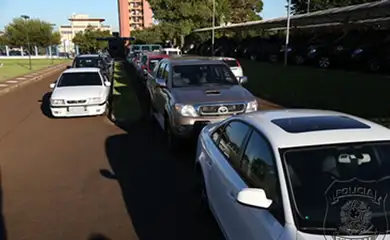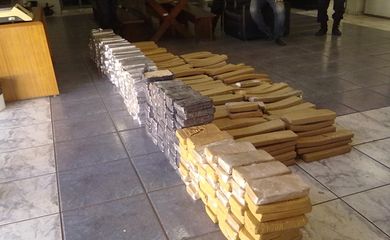Links found between Italian mafia and Brazilian druglords


Investigations conducted by Brazil’s Federal Police and the Federal Public Prosecution Office have unveiled relations between 'Ndrangheta, one of the world’s most powerful criminal organizations, and Brazilian drug trafficking groups

Investigations conducted by Brazil’s Federal Police and the Federal Public Prosecution Office have unveiled relations between 'Ndrangheta, one of the world’s most powerful criminal organizations, and Brazilian drug trafficking groups.
The presence of people involved with the Italian Mafia in Brazilian territory has long been a topic of discussion among security experts. Their involvement no longer a matter of doubt thanks to Operation Monte Pollino, carried out by the Federal Police in March this year, which dismantled a scheme whereby South American cocaine was being transported to Europe.
On Wednesday (May 26), the Federal Public Prosecution Office reported six people under investigation for allegedly being members of a gang that used Porto de Santos, Latin America’s largest port, in the state of São Paulo, to ship tons of cocaine to Europe.
Convinced that all the suspects investigated in Operation Monte Pollino “have a role in a vast criminal network, with branches in several countries and connections with the Italian mafia organization 'Ndrangheta,” public attorneys in Santos have announced they will report at least 14 other people.
According to the Italian institute Demoskopika, the Calabrian mafia organization also known as Montalbano Family generated over 53 billion euros in 2013. The institute declares that the figure was estimated after they were given access to official documents, from which the data were drawn.

Over the course of one year of investigations, over 1.3 tons of the drug was having been previously commercialized by the group. Its chief destinations were the port of Gioia Taura, in Naples; and that of Leixões, Portugal
Reportedly, the Calabrian organization’s greatest source of income was drug trafficking, which generated 24.2 billion euros that year. The tentacles of ‘Ndrangheta, however, also entail illegal recycling, extortion, embezzlement of public funds, gambling, weapons smuggling, prostitution, falsification of documents, and illegal immigration. The institute further affirms that ‘Ndrangheta relies on over 60 thousand associates in at least 30 countries. According to the specialized press, ‘Ndrangheta has long surpassed in economic power and scope the better known Casa Nostra and Camorra.
Federal Police Commissioner Osvaldo Scalezi Júnior declared that the Brazilian investigations were initiated in February, 2013, at the request of the Italian government, which had been probing since 2010 into the shipping of cocaine to Europe from Peru and Bolivia. In March 2014, on the same day approximately 70 Federal Police agents set out to execute in Brazil warrants of arrest as well as search and seizure, in Italy, the Guardia di Finanza – a police force connected to the Ministry of Economy and Finance – launched Operation Bongustaio. In a large international cooperation measure, warrants were also exercised in Spain, Portugal, the UK, the Netherlands, Serbia, Montenegro and Peru.
Twelve people were taken to jail altogether, ten of whom in Brazil, one in Italy and one in Spain. Six other suspects had already been arrested before in Brazil. Over the course of one year of investigations, over 1.3 tons of the drug was having been previously commercialized by the group. Its chief destinations were the port of Gioia Taura, in Naples; and that of Leixões, Portugal.
The drug was brought into Brazil by land and most of it was stored near the city of Campinas, São Paulo. In Santos, the drug was stowed away in cargo ships before heading for ‘Ndrangheta.

Reportedly, the Calabrian organization’s greatest source of income was drug trafficking, which generated 24.2 billion euros that year. (Agência Brasil/arquivo)
After the drug was collected at the European ports, representatives from the financial branch of the Calabrian mafia organization, who used to come to Brazil often or lived in the country, were responsible for paying the members of criminal groups, most of whom Brazilians, who had received the cocaine in its pure state, transported it to Brazilian ports and stowed it away in containers. The money was usually delivered in busy places, like food courts in shopping malls and supermarkets in the city of São Paulo.
Among those brought into custody is a female Brazilian citizen arrested in Spain. Scalezi argues she was the one responsible for sending to Brazil the dollars from ‘Ndrangheta for the payment of middlemen in the scheme.
(with the collaboration of Marcelo Brandão)
Translated by Fabrício Ferreira
Fonte: Links found between Italian mafia and Brazilian druglords




Dê sua opinião sobre a qualidade do conteúdo que você acessou.
Escolha sua manifestação em apenas um clique.
Você será direcionado(a) para o sistema Fala.BR, mas é com a EBC que estará dialogando. O Fala.BR é uma plataforma de comunicação da sociedade com a administração pública, por meio das Ouvidorias.
Sua opinião ajuda a EBC a melhorar os serviços e conteúdos ofertados ao cidadão. Por isso, não se esqueça de incluir na sua mensagem o link do conteúdo alvo de sua manifestação.
Clique aqui para mais informações sobre a Ouvidoria da EBC.










